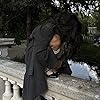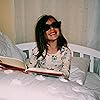To answer questions about
Every Last Word,
please sign up.
Shuichi Saihara
I have OCD, and reading this book made me feel incredibly belittled. Love doesn't cure everything, and that's what this book is saying. Sure, you may find someone who makes you feel good, but having a romantic relationship doesn't solve all of your problems. A serious disorder cannot be solved by romance, that just isn't how things work. So I dont think it portrays OCD at all, if anything it just romanticizes it, which is heartbreaking.
Jumana
You can't really say if it's accurate or not. Everyone goes through OCD differently. However, as someone who does have OCD, I did relate to the character with OCD. I do go through some of the things that she goes through.
Hope this was helpful x
Hope this was helpful x
Sky
Based on my own experience, It's very accurate. The main character deals with intrusive thoughts and the book isn't at all "Oh I have this cute little quirk" but portrays OCD as a serious mental illness. The author really did her research when writing this.
Esh Hope
I have OCD and I feel like it was portrayed perfectly.
Vannah Claire
It's not accurate at all. I have OCD and this book has the "love cures all" trope. I have obsessions and compulsions, and the book doesn't explain the thought spirals at all. It will just say "thoughts" and that's it. There is no description of what the thoughts are or what they are about. This book was hurtful to read, because I felt like it portrayed OCD terribly.
Charlie Herrin
As someone with OCD, I'm going to go ahead and say no. Obviously, OCD manifests itself differently in everyone and I can't speak for everyone with the disorder. I personally couldn't relate, but that doesn't necessarily mean that you can't. If you're trying to learn about the disorder, I wouldn't look here. I think this novel focuses a lot more on the obsessive element of OCD rather than the compulsive element, but if that's something you can relate to you might find something here.
Laura
This answer contains spoilers…
(view spoiler)
Katherine Pfister
As someone who was recently diagnosed with OCD, yes and no. Obviously, I can't speak for everyone because OCD is a spectrum and everyone has different opinions.
First of all, this book paints a picture of someone with a more severe type of OCD, which is also commonly what media represents. This representation caused me to struggle in silence for many years because all I knew of OCD was the severe type and it made me believe that I couldn't possibly have OCD because it didn't feel that severe. For me, I have a little fixation with even numbers, but nowhere near the level that sam had, only feeling slightly uncomfortable but manageable when I deal with things that are uneven. Because of this, it caused me to think I was OCD-baiting or that I was acting on my previously self-diagnosed "hypochondria behavior" That issue is not necessarily the book's fault, but just a lack of representation in all media's portrayal of OCD.
Now, for the Love-fixes-all trope, I get it. However, I don't actually think this book truly expresses that trope. It documents a teenager's reality of battling OCD, struggling with society's expectations, and just wanting to "fit in". In the end, Sam isn't cured from OCD. She continues going to therapy and she continues to struggle, but the ending shows that communicating to those you love and making those relationships can really help, at least they do for me. AJ doesn't cure her OCD, but instead, he is an addition to her support system which is really refreshing to hear. Someone that truly cares about her and is ready to stand by her and support her in whatever she may need in the future. The book ends in a moment in her life where things are looking up, it's not necessarily saying that her life will be perfect from now on. It also shows me, new to this diagnosis, that love and happy life is possible. OCD isn't a death sentence, and it doesn't always mean you have to live a horrible life. You can have OCD and be able to have happy moments. It won't all be sunshine and rainbows, but it doesn't have to be stormy skies forever.
First of all, this book paints a picture of someone with a more severe type of OCD, which is also commonly what media represents. This representation caused me to struggle in silence for many years because all I knew of OCD was the severe type and it made me believe that I couldn't possibly have OCD because it didn't feel that severe. For me, I have a little fixation with even numbers, but nowhere near the level that sam had, only feeling slightly uncomfortable but manageable when I deal with things that are uneven. Because of this, it caused me to think I was OCD-baiting or that I was acting on my previously self-diagnosed "hypochondria behavior" That issue is not necessarily the book's fault, but just a lack of representation in all media's portrayal of OCD.
Now, for the Love-fixes-all trope, I get it. However, I don't actually think this book truly expresses that trope. It documents a teenager's reality of battling OCD, struggling with society's expectations, and just wanting to "fit in". In the end, Sam isn't cured from OCD. She continues going to therapy and she continues to struggle, but the ending shows that communicating to those you love and making those relationships can really help, at least they do for me. AJ doesn't cure her OCD, but instead, he is an addition to her support system which is really refreshing to hear. Someone that truly cares about her and is ready to stand by her and support her in whatever she may need in the future. The book ends in a moment in her life where things are looking up, it's not necessarily saying that her life will be perfect from now on. It also shows me, new to this diagnosis, that love and happy life is possible. OCD isn't a death sentence, and it doesn't always mean you have to live a horrible life. You can have OCD and be able to have happy moments. It won't all be sunshine and rainbows, but it doesn't have to be stormy skies forever.
Jo Hendricks
As someone with Pure O, I found this novel very accurate. OCD is different for everyone and for me I relate to Sam.
Danielle Stitt
I know I'm late to answer, but I know one of the many critiques is that this book romanticizes OCD and treats love as a cure all. I don't think that's what the author was trying to do. I don't have OCD, but I do struggle with OSDD and a few other illnesses. To me, I think the author was showing how nice it is to have someone who is just there, who is present. This type of relationship can come in many forms. In Sam's case, it came in the form of love and AJ.
About Goodreads Q&A
Ask and answer questions about books!
You can pose questions to the Goodreads community with Reader Q&A, or ask your favorite author a question with Ask the Author.
See Featured Authors Answering Questions
Learn more










